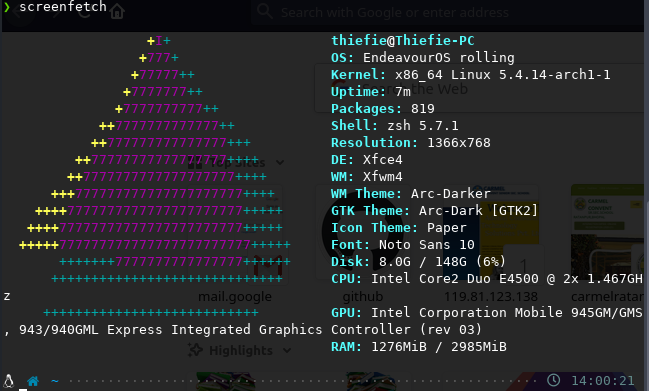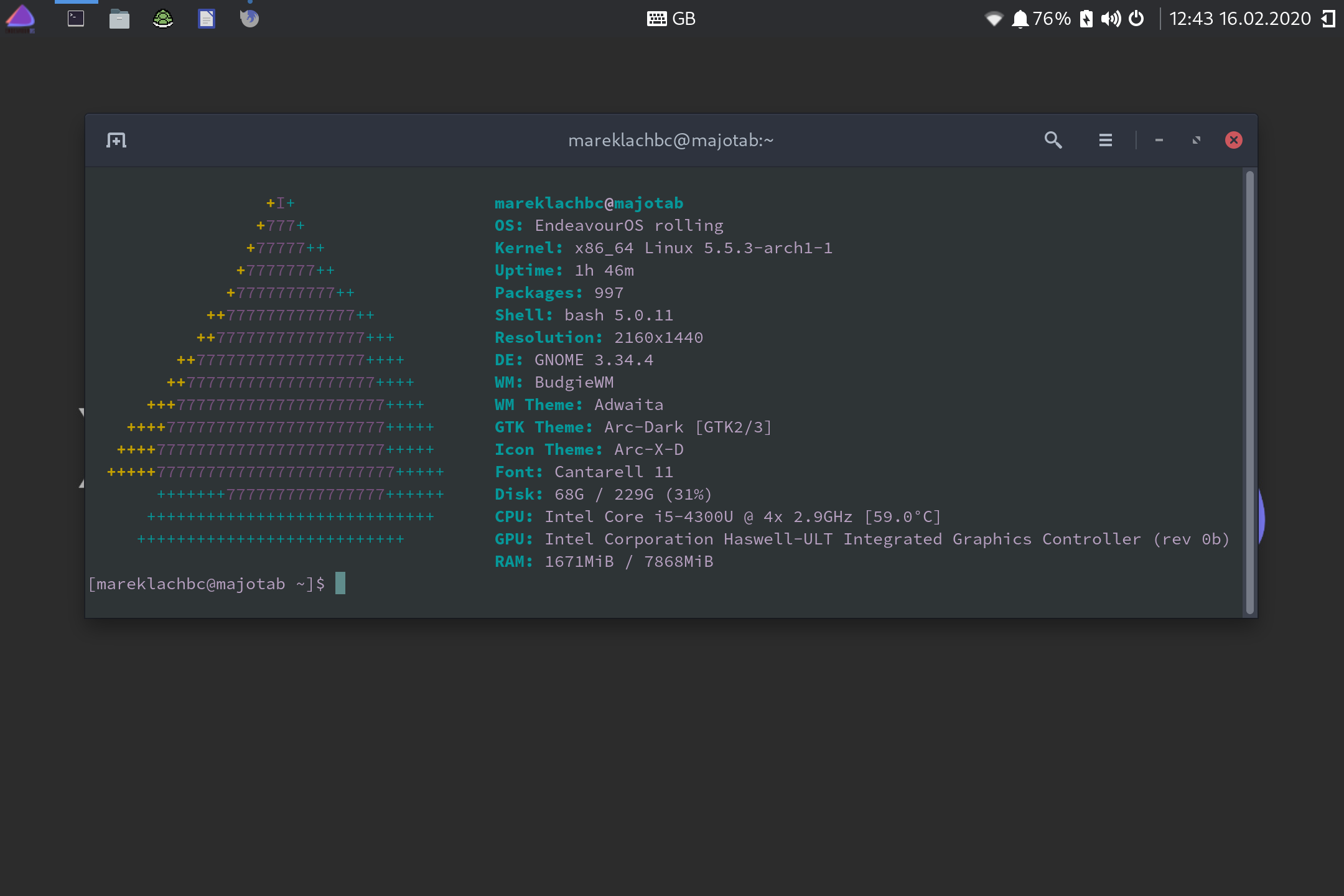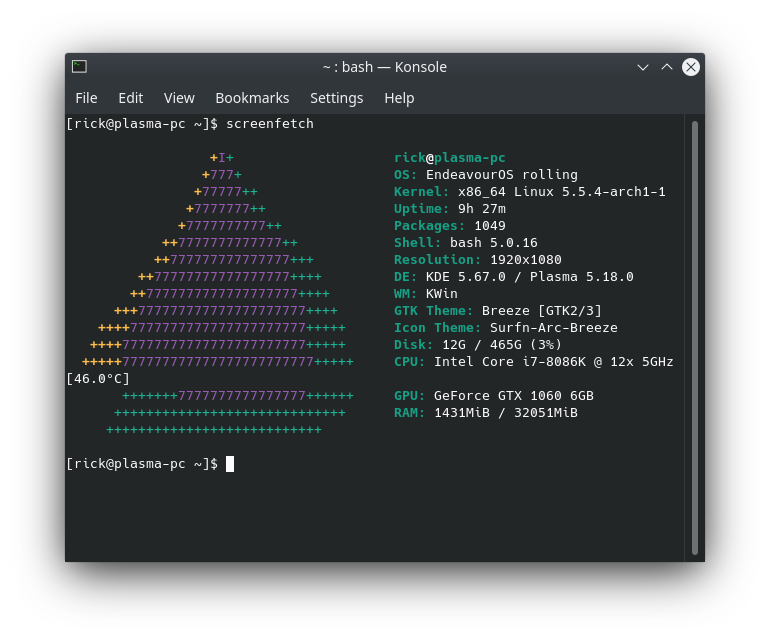Well, luckily for you the net installer give you just about any desktop you could want!
hello,you take whatever you feel best with; do vm tests
Möglicherweise hilft dir das weiter! ![]()
Ich bin mit Xfce sehr zufrieden ![]()
Mine is a cheap laptop, five years old, preliminary on Ubuntu, and now working fine.
Summary
System: Host: toto Kernel: 5.4.14-arch1-1 x86_64 bits: 64 compiler: gcc v: 9.2.0 Console: tty 1 wm: kwin_x11
dm: SDDM Distro: Arch Linux
Machine: Type: Portable System: Dell product: Inspiron 3551 v: A04 serial: Chassis: type: 8 serial:
Mobo: Dell model: 04XH5N v: A00 serial: UEFI: Dell v: A04 date: 07/07/2015
Battery: ID-1: BAT0 charge: 31.5 Wh condition: 31.5/41.4 Wh (76%) volts: 16.7/14.8 model: SMP-SDI2.8 DELL VN3N047
type: Li-ion serial: status: Full
CPU: Topology: Dual Core model: Intel Celeron N2840 bits: 64 type: MCP arch: Silvermont rev: 8 L1 cache: 112 KiB
L2 cache: 1024 KiB
flags: lm nx pae sse sse2 sse3 sse4_1 sse4_2 ssse3 vmx bogomips: 8666
Speed: 500 MHz min/max: 500/2582 MHz Core speeds (MHz): 1: 500 2: 500
Graphics: Device-1: Intel Atom Processor Z36xxx/Z37xxx Series Graphics & Display vendor: Dell driver: i915 v: kernel
bus ID: 00:02.0 chip ID: 8086:0f31
Display: server: X.Org 1.20.7 driver: intel unloaded: fbdev,modesetting,vesa compositor: kwin_x11
resolution: 1920x1080~60Hz
OpenGL: renderer: Mesa DRI Intel Bay Trail v: 4.2 Mesa 19.3.2 compat-v: 3.0 direct render: Yes
Audio: Device-1: Intel Atom Processor Z36xxx/Z37xxx Series High Definition Audio vendor: Dell driver: snd_hda_intel
v: kernel bus ID: 00:1b.0 chip ID: 8086:0f04
Sound Server: ALSA v: k5.4.14-arch1-1
Network: Device-1: Qualcomm Atheros QCA9565 / AR9565 Wireless Network Adapter vendor: Dell driver: ath9k v: kernel
port: f000 bus ID: 03:00.0 chip ID: 168c:0036
IF: wlan0 state: up mac:
Device-2: Qualcomm Atheros type: USB driver: btusb bus ID: 1-2.1:8 chip ID: 0cf3:e005
Drives: Local Storage: total: 447.13 GiB used: 195.91 GiB (43.8%)
ID-1: /dev/sda vendor: Crucial model: CT480BX500SSD1 size: 447.13 GiB speed: 3.0 Gb/s serial: rev: R022
scheme: GPT
Partition: ID-1: / size: 48.97 GiB used: 19.14 GiB (39.1%) fs: ext4 dev: /dev/sda2
ID-2: /home size: 385.74 GiB used: 176.73 GiB (45.8%) fs: ext4 dev: /dev/sda3
ID-3: swap-1 size: 3.73 GiB used: 43.2 MiB (1.1%) fs: swap dev: /dev/sda4
Sensors: System Temperatures: cpu: 43.0 C mobo: 44.0 C
Fan Speeds (RPM): cpu: 2532
Info: Processes: 136 Uptime: 13h 46m Memory: 3.73 GiB used: 1.50 GiB (40.3%) Init: systemd v: 244 Compilers: gcc: 9.2.0
clang: 9.0.1 Shell: bash (sudo) v: 5.0.11 running in: konsole inxi: 3.0.37
When I change HDD with SSD, I want to come back to ArchLinux and I discover endeavourOS which made install simpler.
Mine is a cheap laptop, five years old, preliminary on Ubuntu, and now working fine.
Still an old five and nine years old laptop can serve as a computer for EndeavourOS. ![]()
I tried XFCE4, Plasma and Deepin already. Until now there is no fitting one. I will try the rest of the desktop environments.

My beastly setup
-`
.o+` ws@endeavouros
`ooo/ OS: Arch Linux
`+oooo: Kernel: x86_64 Linux 5.4.4-arch1-1
`+oooooo: Uptime: 41m
-+oooooo+: Packages: 1294
`/:-:++oooo+: Shell: bash 5.0.11
`/++++/+++++++: Resolution: 1920x1080
`/++++++++++++++: DE: GNOME 3.34.2
`/+++ooooooooooooo/` WM: Mutter
./ooosssso++osssssso+` WM Theme:
.oossssso-````/ossssss+` GTK Theme: Adwaita [GTK2/3]
-osssssso. :ssssssso. Icon Theme: Adwaita
:osssssss/ osssso+++. Font: Cantarell 11
/ossssssss/ +ssssooo/- Disk: 716G / 1,1T (66%)
/ossssso+/:- -:/+osssso+- CPU: Intel Core i5-8600K @ 6x 4.3GHz [37.0°C] +sso+:- .-/+oso: GPU: Mesa DRI Intel® UHD Graphics 630 (Coffeelake 3x8 GT2)
++:. -/+/ RAM: 1782MiB / 7825MiB
. /
Hello @mr.ed
It’s been a while since Antergos days. Is this a new install here? Did you try this command? It is set up for EndeavourOS.
screenfetch
Why do you still use this “old” kernel? Do you have something that won’t run with a newer kernel?
Yes i didn’t notice as @Endlich pointed out. You are on older kernel as the current kernel is 5.4.15
sudo pacman -Syu
This is my cheapo…
System:
Host: lemon-pc Kernel: 5.4.15-arch1-1 x86_64 bits: 64 compiler: gcc
v: 9.2.0 Desktop: Xfce 4.14.2 tk: Gtk 3.24.13 info: xfce4-panel wm: xfwm4
dm: LightDM 1.30.0 Distro: EndeavourOS
Machine:
Type: Portable System: Dell product: Inspiron 15-3552 v: 4.4.0
serial: <root required> Chassis: type: 8 serial: <root required>
Mobo: Dell model: ������ v: ��� serial: <root required>
UEFI [Legacy]: Dell v: 4.4.0 date: 03/06/2018
Battery:
ID-1: BAT0 charge: 30.1 Wh condition: 30.1/37.3 Wh (81%) volts: 16.7/14.8
model: PANASONIC DELL 78V9D63 type: Unknown serial: 187 status: Full
Device-1: hidpp_battery_0 model: Logitech Wireless Mouse
serial: 4055-5e-3d-da-cf charge: 55% (should be ignored) rechargeable: yes
status: Discharging
CPU:
Topology: Dual Core model: Intel Celeron N3050 bits: 64 type: MCP
arch: Airmont rev: 3 L2 cache: 1024 KiB
flags: lm nx pae sse sse2 sse3 sse4_1 sse4_2 ssse3 vmx bogomips: 6402
Speed: 539 MHz min/max: 480/2160 MHz Core speeds (MHz): 1: 539 2: 652
Graphics:
Device-1: Intel Atom/Celeron/Pentium Processor x5-E8000/J3xxx/N3xxx
Integrated Graphics
vendor: Dell driver: i915 v: kernel bus ID: 00:02.0 chip ID: 8086:22b1
Display: x11 server: X.Org 1.20.7 driver: intel
unloaded: fbdev,modesetting,vesa resolution: 1366x768~60Hz
Message: Unable to show advanced data. Required tool glxinfo missing.
Audio:
Device-1: Intel Atom/Celeron/Pentium Processor x5-E8000/J3xxx/N3xxx Series
High Definition Audio
vendor: Dell driver: snd_hda_intel v: kernel bus ID: 00:1b.0
chip ID: 8086:2284
Sound Server: ALSA v: k5.4.15-arch1-1
Network:
Device-1: Qualcomm Atheros QCA9565 / AR9565 Wireless Network Adapter
vendor: Dell driver: ath9k v: kernel port: f040 bus ID: 01:00.0
chip ID: 168c:0036
IF: wlan0 state: up mac: b0:c0:90:40:74:45
Device-2: Qualcomm Atheros type: USB driver: btusb bus ID: 1-2.1:7
chip ID: 0cf3:e005
Drives:
Local Storage: total: 119.24 GiB used: 25.30 GiB (21.2%)
ID-1: /dev/sda vendor: Crucial model: CT128MX100SSD1 size: 119.24 GiB
speed: 6.0 Gb/s serial: 14270C890760 rev: MU03 scheme: MBR
Partition:
ID-1: / size: 108.73 GiB used: 25.28 GiB (23.3%) fs: ext4 dev: /dev/sda1
ID-2: swap-1 size: 8.27 GiB used: 18.8 MiB (0.2%) fs: swap dev: /dev/sda2
Sensors:
System Temperatures: cpu: 48.0 C mobo: 48.0 C
Fan Speeds (RPM): cpu: 0
Info:
Processes: 158 Uptime: 1h 43m Memory: 3.76 GiB used: 1.47 GiB (39.1%)
Init: systemd v: 244 Compilers: gcc: 9.2.0 Shell: bash v: 5.0.11
running in: xfce4-terminal inxi: 3.0.37
Hello @Rick, yes, I have used screenfetch and I have also used sudo pacman -Syu. And, @Endlich, my system has been running GNOME since the days of Antergos. However, there is always a message that a Python version is not compatible. Maybe this is the reason why the current kernel cannot be loaded?
@mr.ed
Do you get this message when updating? Maybe you can share that by posting it someway because if the kernel isn’t updating that is no good. Please post it in a new thread.
Six-year-old Dell laptop that’s never really given me any trouble, no matter what OS it’s had.
[mike@SPY ~]$ inxi -Fx
System:
Host: SPY Kernel: 5.4.15-arch1-1 x86_64 bits: 64 compiler: gcc v: 9.2.0
Desktop: Cinnamon 4.4.8 Distro: EndeavourOS
Machine:
Type: Portable System: Dell product: Inspiron 3521 v: A05
serial: <root required>
Mobo: Dell model: 033MX4 v: A00 serial: <root required>
UEFI [Legacy]: Dell v: A05 date: 01/03/2013
Battery:
ID-1: BAT1 charge: 3.7 Wh condition: 3.7/48.8 Wh (8%)
model: LGC DELL 49VTP status: Full
CPU:
Topology: Dual Core model: Intel Core i3-3227U bits: 64 type: MT MCP
arch: Ivy Bridge rev: 9 L2 cache: 3072 KiB
flags: avx lm nx pae sse sse2 sse3 sse4_1 sse4_2 ssse3 vmx bogomips: 15168
Speed: 798 MHz min/max: 800/1900 MHz Core speeds (MHz): 1: 798 2: 798
3: 798 4: 798
Graphics:
Device-1: Intel 3rd Gen Core processor Graphics vendor: Dell driver: i915
v: kernel bus ID: 00:02.0
Display: x11 server: X.Org 1.20.7 driver: intel
unloaded: fbdev,modesetting,vesa resolution: 1366x768~60Hz
OpenGL: renderer: Mesa DRI Intel Ivybridge Mobile v: 4.2 Mesa 19.3.2
direct render: Yes
Audio:
Device-1: Intel 7 Series/C216 Family High Definition Audio vendor: Dell
driver: snd_hda_intel v: kernel bus ID: 00:1b.0
Sound Server: ALSA v: k5.4.15-arch1-1
Network:
Device-1: Realtek RTL810xE PCI Express Fast Ethernet vendor: Dell
driver: r8169 v: kernel port: 2000 bus ID: 01:00.0
IF: enp1s0 state: down mac: f0:1f:af:00:6a:bb
Device-2: Intel Wireless 7260 driver: iwlwifi v: kernel port: 2000
bus ID: 02:00.0
IF: wlan0 state: up mac: ac:7b:a1:e2:56:8a
Drives:
Local Storage: total: 1.10 TiB used: 906.12 GiB (80.4%)
ID-1: /dev/sda vendor: Samsung model: SSD 860 EVO 250GB size: 232.89 GiB
ID-2: /dev/sdb vendor: Patriot model: Burst size: 894.25 GiB
Partition:
ID-1: / size: 109.53 GiB used: 66.01 GiB (60.3%) fs: ext4 dev: /dev/sda3
ID-2: swap-1 size: 7.81 GiB used: 0 KiB (0.0%) fs: swap dev: /dev/sda4
Sensors:
System Temperatures: cpu: 46.0 C mobo: N/A
Fan Speeds (RPM): cpu: 2600
Info:
Processes: 217 Uptime: 10h 34m Memory: 7.66 GiB used: 4.80 GiB (62.7%)
Init: systemd Compilers: gcc: 9.2.0 Shell: bash v: 5.0.11 inxi: 3.0.37
Running on Surface Pro 3:

Custom Built

A nice build, Rick.